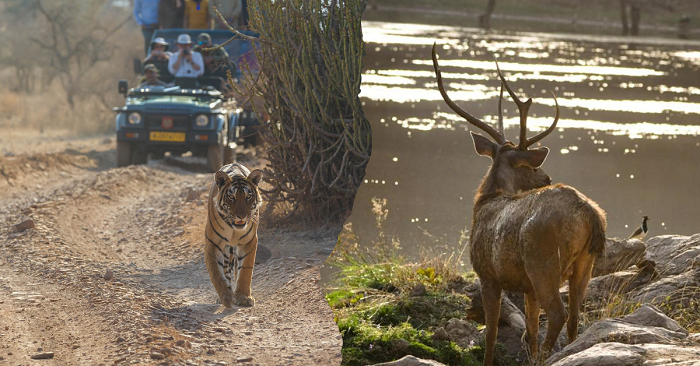 June 13, 2025
June 13, 2025
Located in the heart of Rajasthan, Ranthambore is the ideal place for wildlife enthusiasts and nature lovers. The Ranthambore National Park is famous for its stunning tigers and magnificent, ancient forts. Every year the national park attracts thousands of tourists. With a rise in popularity comes a greater responsibility, and eco-tourism in Ranthambore is increasing. More and more travelers are choosing to travel sustainably, making decisions to preserve the park’s fragile ecosystem and to enhance the well-being of everyone.
What is Eco-Tourism and Why Is It Important in Ranthambore?
Eco-tourism is travelling responsibly. This includes focusing on limited environmental impact, conserving biodiversity, and contributing to the continued well-being of the local population. In a biodiversity hotspot like Ranthambore, where many people come every year for a Ranthambore stay and safari, eco-tourism is a necessity rather than a trend. The park is home to the Bengal tiger and many more species, including leopards, sloth bears, crocodiles, and various species of birds. The importance of preserving a natural treasure like Ranthambore relies on tourists making contributions, as well as decisions made by the hospitality industry.
Sustainable Practices to Follow When Visiting
Whether you are visiting Ranthambore for wildlife photography, a peaceful retreat, or adventure, there are a few sustainable practices you can incorporate:
- Stay on Designated Safari Trails: Stay on safari routes to reduce the chance of disturbing wildlife.
- Reduce Usage of Plastic: Use reusable water bottles and carry your items in cloth bags.
- Respect Nature: Be quiet when on safari and do not interact with or feed animals when on safari.
- Support Local: Use local guides, artisans and restaurants to help the local economy.
- Choose Green: Stay at hotels or resorts that use green strategies with solar energy, rainwater harvesting and waste management.
Many 5 star hotels in Ranthambore offer eco-luxury products that provide eco-friendly experiences while still providing luxury, as hotels that borrow natural resources also contribute to conservation; workers in their staff teams are usually their neighbors, so you are helping people in the community experience wealth in their community through your stay.
What Can Eco-Tourism Do for Your Ranthambore Experience?
Eco-tourism is not about sacrificing comfort; it is about enhancing your experience without harming the environment. Eco-stays in one of the many Ranthambore hotels or safari eco-friendly experiences can bring you closer to nature and can increase your interest in wildlife while keeping nature safe. The trained guides will help you provide context on animal behaviors, ecosystems of the forests, and conservation issues.
Frequently Asked Questions
Q1. What is the most suitable season for eco-tourism in Ranthambore?
A1. When the park is open and wildlife sightings are high, October to June is the perfect season.
Q2. Are eco-friendly safaris different from regular safaris?
A2. Not in terms of format, but eco-friendly safaris emphasize conservation education, utilize fuel-efficient vehicles and follow stricter environmental standards.
Q3. Are eco-conscious 5-star hotels available in Ranthambore?
A3. Yes, there are many luxury hotels in Ranthambore that use sustainable practices without compromising comfort, filling your stay with eco-luxury!